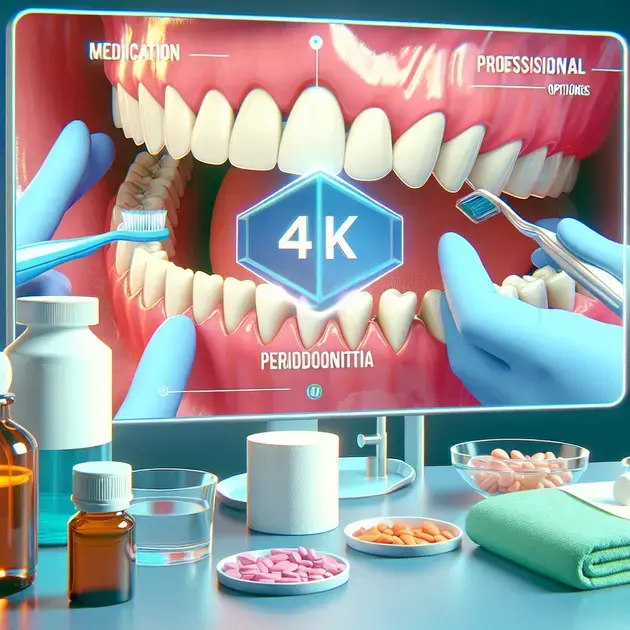Are you looking for an effective medication for periodontitis? Look no further, as this comprehensive guide will provide you with all the information you need to combat this common dental issue.
Periodontitis, also known as gum disease, affects a large percentage of the population worldwide. With advancements in dental research, there are now several treatment options available to effectively manage and treat this condition. Let’s explore the best medications and strategies to combat periodontitis in this detailed guide.

Understanding Periodontitis: A Closer Look at the Disease
Periodontitis is a serious gum infection that damages the soft tissue and destroys the bone that supports your teeth. It can lead to tooth loss if not properly treated. Understanding the disease is crucial for prevention and effective management.
To learn more about periodontitis, you can visit reputable medical websites such as WebMD or the American Dental Association. These sites provide detailed information on the causes, symptoms, and treatment options for periodontitis. Additionally, scheduling a consultation with a periodontist can help you gain a deeper understanding of your specific condition.
Regular dental check-ups are essential for early detection of periodontitis. Dentists use tools like probing depths and X-rays to assess the health of your gums and teeth. By staying informed and proactive about your dental health, you can better protect yourself against periodontitis.
Maintaining good oral hygiene practices, such as brushing and flossing daily, is key to preventing periodontitis. Using products recommended by dental professionals, like electric toothbrushes and antibacterial mouthwashes, can also help keep gum disease at bay.
Incorporating a healthy diet rich in vitamins and minerals can support overall gum health and reduce the risk of periodontitis. Foods high in antioxidants, such as leafy greens and berries, can help fight inflammation and promote gum tissue regeneration.
Medication Options for Periodontitis: What Works Best
When it comes to treating periodontitis, medication can play a significant role in controlling the infection and promoting gum health. Understanding the available medication options and their effectiveness is essential for managing the disease.
Antibiotics are commonly prescribed to combat the bacteria responsible for periodontitis. Medications like doxycycline or minocycline can help reduce inflammation and prevent further damage to the gums and bones. These antibiotics are usually taken in pill form or applied directly to the infected area.
For more advanced cases of periodontitis, antimicrobial mouth rinses or gels may be recommended by your dentist. These products target bacteria in the pockets of the gums and can help reduce plaque and inflammation. Chlorhexidine is a common ingredient in these oral rinses and has been proven effective in treating gum disease.
In some cases, your dentist may suggest nonsteroidal anti-inflammatory drugs (NSAIDs) to manage pain and swelling associated with periodontitis. Over-the-counter medications like ibuprofen can help alleviate discomfort during treatment and promote healing of the gums.
It’s important to follow your dentist’s recommendations regarding medication usage and dosage. Be sure to inform them of any allergies or existing medical conditions before starting a new treatment regimen for periodontitis.
Effective Strategies for Managing Periodontitis
Successfully managing periodontitis requires a combination of professional treatment and good oral hygiene practices at home. By following these effective strategies, you can improve the health of your gums and prevent the progression of gum disease.
Scheduling regular appointments with a periodontist is crucial for ongoing care and monitoring of your periodontitis. These specialists can provide deep cleanings, known as scaling and root planing, to remove plaque and tartar from below the gumline and smooth the roots of the teeth.
Implementing a consistent oral care routine that includes brushing twice a day with a soft-bristled brush and flossing daily is essential for managing periodontitis. Using antimicrobial toothpaste and mouthwash can further help reduce bacteria and plaque buildup in your mouth.
Avoiding tobacco products and limiting alcohol consumption can also contribute to better gum health and aid in the management of periodontitis. Smoking can exacerbate gum disease and hinder the effectiveness of treatment, so quitting smoking is highly recommended.
Eating a balanced diet and maintaining a healthy lifestyle can support your overall gum health and immune system. Foods high in sugar and carbohydrates can fuel bacteria in the mouth, so opting for nutritious options like fruits, vegetables, and lean proteins can benefit your oral health.
Stress management techniques such as yoga, meditation, or exercise can help reduce inflammation in the body and support your body’s ability to fight off infections like periodontitis. Prioritizing self-care and relaxation can have positive effects on your dental health.

Understanding Periodontitis: A Closer Look at the Disease
Periodontitis is a serious gum infection that damages the soft tissue and destroys the bone that supports your teeth. This chronic inflammatory disease is caused by bacteria found in plaque and can lead to tooth loss if left untreated. Common symptoms include swollen gums, bright red or purplish gums, gums that feel tender when touched, and gums that bleed easily.
One of the main risk factors for periodontitis is poor oral hygiene. Failure to brush and floss regularly allows plaque to build up and harden into tartar, which can only be removed by a dental professional. Other risk factors include smoking, hormonal changes in women, diabetes, certain medications, and genetic susceptibility.
To diagnose periodontitis, your dentist will examine your gums, measure any pocket formation between the gums and teeth, and possibly take X-rays to see if there is any bone loss. Treatment options may include deep cleaning procedures like scaling and root planing, medications, and in severe cases, surgery to restore supportive tissues.
Prevention is key when it comes to periodontitis. Maintaining good oral hygiene by brushing twice a day, flossing daily, and scheduling regular dental check-ups can significantly reduce your risk of developing this debilitating disease. In advanced cases, working closely with a periodontist can help manage the condition and prevent further damage to your gums and teeth.
Overall, understanding periodontitis is crucial in order to effectively prevent and treat this disease. By recognizing the symptoms, knowing the risk factors, and committing to a thorough oral hygiene routine, you can safeguard your oral health and preserve your smile for years to come.
Medication Options for Periodontitis: What Works Best
When it comes to treating periodontitis, medication can play a crucial role in controlling the bacterial infection and reducing inflammation in the gums. There are several types of medications that may be prescribed to help manage the symptoms and progression of the disease.
Antibiotics are commonly used to target and kill the bacteria causing the infection. They can be taken orally or applied directly to the affected areas in the form of mouth rinses or gels. Antibiotics can help reduce the size of periodontal pockets, control the spread of infection, and promote healing of the gums.
Anti-inflammatory drugs may also be prescribed to reduce swelling and discomfort in the gums. These medications can help alleviate pain, redness, and tenderness, making it easier to perform daily oral hygiene practices without causing further irritation.
In some cases, antimicrobial mouthwashes containing chlorhexidine may be recommended to help control plaque and prevent the growth of bacteria in the mouth. These mouthwashes are typically used in combination with other forms of treatment to enhance their effectiveness.
It’s important to follow your dentist or periodontist’s recommendations when it comes to medication options for periodontitis. Compliance with the prescribed regimen, along with a consistent oral hygiene routine, can significantly improve the outcome of treatment and help maintain the health of your gums and teeth in the long run.
Effective Strategies for Managing Periodontitis
Managing periodontitis requires a comprehensive approach that combines professional treatment with diligent at-home care. By following a few key strategies, you can help control the progression of the disease and minimize the impact it has on your oral health.
First and foremost, sticking to a strict oral hygiene routine is essential for managing periodontitis. Brushing your teeth at least twice a day, flossing daily, and using an antiseptic mouthwash can help reduce plaque buildup and prevent further infection in the gums.
Regular dental check-ups and cleanings are also important for monitoring the status of your periodontal health. Your dentist can evaluate the condition of your gums, measure any changes in pocket depth, and recommend additional treatments or interventions as needed.
Quitting smoking is another crucial step in managing periodontitis. Smoking weakens the immune system, impairs blood flow to the gums, and increases the risk of infection and gum disease progression. By kicking the habit, you can significantly improve the health of your gums and overall oral health.
Healthy lifestyle choices, such as eating a balanced diet rich in vitamins and minerals, staying hydrated, and avoiding sugary or acidic foods, can also support your efforts in managing periodontitis. Maintaining a healthy body weight and managing stress levels can contribute to your overall well-being and aid in the healing process of your gums.
By incorporating these effective strategies into your daily routine, you can take control of your periodontal health and work towards preventing further damage to your gums and teeth. Working closely with your dental care team and staying committed to a proactive approach to oral hygiene can help you achieve lasting results in managing periodontitis.
Conclusion
In conclusion, understanding periodontitis is crucial for effectively preventing and treating this debilitating disease. By recognizing the symptoms, knowing the risk factors, and maintaining a thorough oral hygiene routine, individuals can safeguard their oral health and preserve their smiles for years to come.
When it comes to treating periodontitis, medication plays a crucial role in controlling bacterial infections and reducing inflammation in the gums. Antibiotics, anti-inflammatory drugs, and antimicrobial mouthwashes are common medication options that can help manage symptoms and promote healing of the gums when used in combination with professional treatment.
To effectively manage periodontitis, individuals should adhere to a strict oral hygiene routine, attend regular dental check-ups, quit smoking, make healthy lifestyle choices, and work closely with their dental care team. By incorporating these strategies into their daily routine, individuals can take control of their periodontal health and prevent further damage to their gums and teeth, ultimately leading to improved oral health outcomes.



